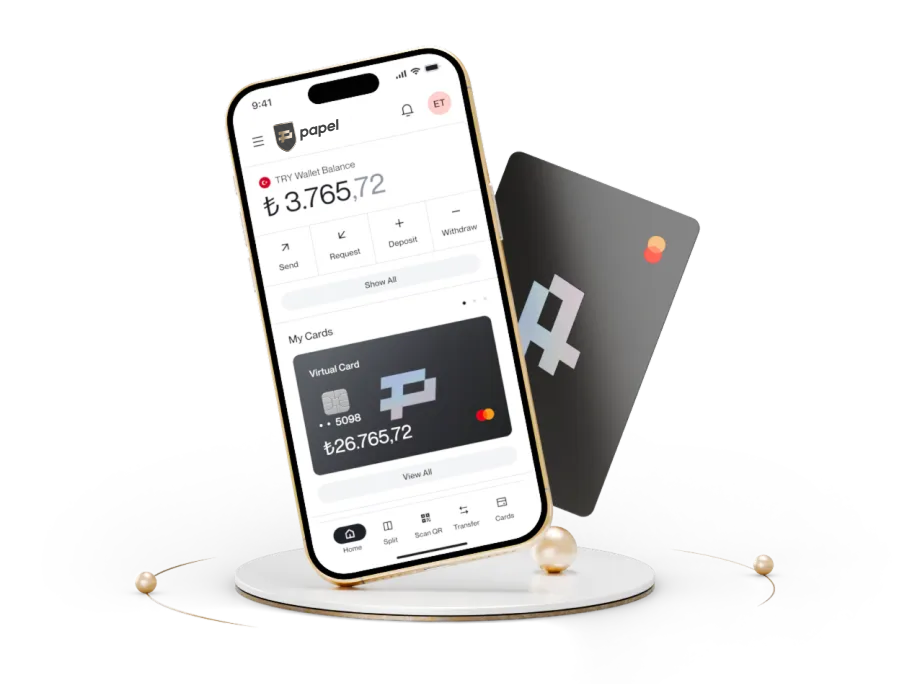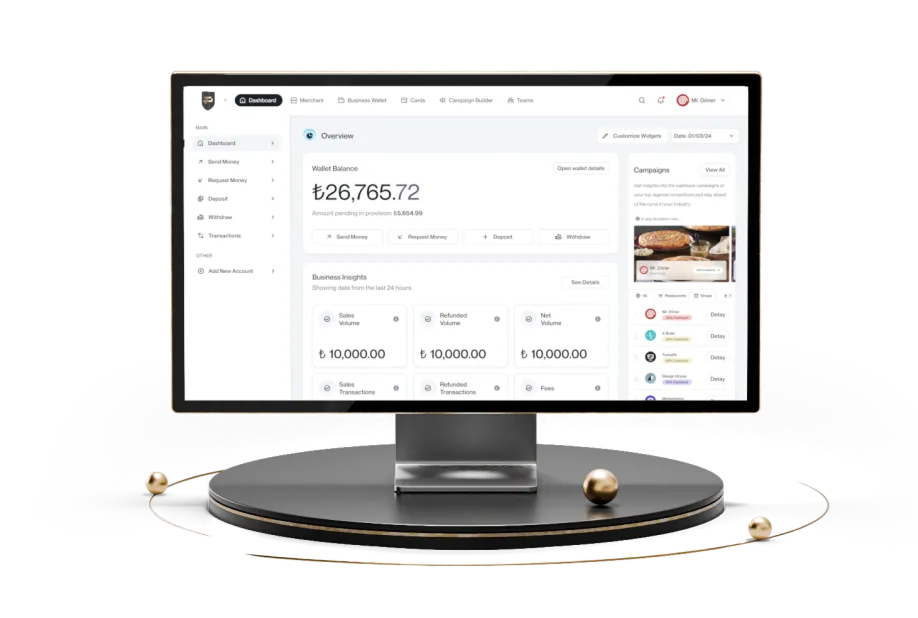What Are MCC Codes? List of MCC Codes for Various Sectors
These codes play a pivotal role in ensuring the financial ecosystem functions reliably and efficiently, influencing everything from banks to payment systems and industries to consumers. Find answers to your questions about MCC codes and their importance for sectors on the Papel Blog.
Introduction: In the financial world, MCC codes (Merchant Category Codes) are an unseen yet impactful system used to define business activities and regulate sector-specific transactions. These four-digit codes do more than categorize businesses; they ensure banks and payment systems operate securely, transparently, and efficiently. From restaurants to supermarkets, airlines to healthcare sectors, MCC codes simplify our lives by analyzing consumer behavior, facilitating tax applications, and supporting sectoral campaigns. Let’s explore how MCC codes contribute to business growth and enhance consumer experiences.
What Are MCC Codes?
MCC codes (Merchant Category Codes) are four-digit codes assigned based on the industry a business operates. These codes are used to identify the types of products and services a business offers and are assigned by banks, payment systems, and credit card companies. MCC codes play a significant role in categorizing transactions, implementing tax policies, analyzing expenditures, and detecting fraud. For instance, a supermarket purchase will have a different MCC code than a restaurant expense, enabling banks to classify customer spending. Moreover, MCC codes allow for tax benefits or sector-specific campaigns and help identify suspicious transactions. Examples include 5411 for supermarkets, 5812 for restaurants, and 4511 for airlines. MCC codes are crucial tools for streamlining transactions and ensuring the financial system operates securely and effectively.
How Do MCC Codes Work?
Payment systems automatically identify MCC codes during a transaction based on the type of product or service offered. The process works as follows: when a customer makes a payment at a business using a credit or debit card, the business's POS terminal or virtual payment system sends transaction details, including the MCC code, to the bank or payment network. This code indicates the sector where the transaction occurred, such as 5812 for restaurants or 7011 for hotels. Banks, payment networks, and financial institutions use these codes to classify the transaction and assign it to the appropriate spending category. MCC codes are also instrumental in determining tax advantages, cashback offers, and rewards systems. For instance, if a credit card offers a "5% discount on dining," this discount applies only to transactions classified with the restaurant MCC code (5812). Additionally, MCC codes help detect fraud; unusual transactions in a sector can signal suspicious activity. This system allows banks, payment providers, and businesses to better track, manage, and optimize transactions.
How Are MCC Codes Used?
MCC codes serve a variety of purposes for banks, payment systems, and financial institutions. Their versatile applications ensure the payment ecosystem operates smoothly, securely, and efficiently. Businesses must ensure they are correctly categorized under the appropriate MCC code, as these codes directly affect customer benefits and regulatory compliance. Here are the primary uses of MCC codes:
- Categorizing Transactions
- Tracking and Analyzing Expenditures
- Detecting Fraud
- Implementing Tax and Discount Policies
- Enabling Cashback and Reward Programs
- Supporting Sector-Specific Campaigns
Categorizing Transactions
MCC codes identify the industry a business operates in and communicate this information during transactions. For instance, a supermarket transaction is categorized under code 5411, while an airline ticket purchase falls under 4511. Accurate categorization is crucial for businesses.
Tracking and Analyzing Expenditures
Banks use MCC codes to analyze customer spending habits. This data allows for easier classification and analysis of transactions, enabling banks to create personalized campaigns or understand general consumer behavior.
Detecting Fraud
MCC codes help identify suspicious transactions. For example, if a customer typically does not purchase jewelry but makes a transaction classified under the jewelry and watches MCC code (5094), banks can flag this as unusual and take necessary security measures.
Implementing Tax and Discount Policies
Banks may offer tax advantages or discounts for specific sectors. MCC codes ensure these benefits are applied only to the relevant sectors. For instance, varying VAT rates for different industries are accurately implemented using MCC codes.
Enabling Cashback and Reward Programs
MCC codes form the basis for cashback and reward systems offered by credit and debit cards. For example, a card offering "10% cashback on restaurant spending" will only apply this benefit to transactions classified under the restaurant MCC code (5812).
Supporting Sector-Specific Campaigns
Payment providers and banks use MCC codes to organize campaigns targeting specific sectors. For instance, an e-commerce campaign may apply exclusively to businesses categorized under the e-commerce MCC code (5968).
Why Are MCC Codes Important?
MCC codes are indispensable for regulating financial transactions, enhancing customer experiences, and increasing security. These four-digit codes categorize businesses and ensure accurate classification of financial transactions, benefiting businesses, banks, and customers alike. MCC codes help streamline the payment ecosystem, allowing banks and payment systems to analyze customer spending habits and offer personalized campaigns. For example, a dining discount campaign on a credit card applies only to transactions categorized under the restaurant MCC code (5812). MCC codes also ensure accurate tax applications, enabling businesses to benefit from tax incentives tailored to specific sectors. Moreover, MCC codes play a vital role in fraud detection, signaling suspicious activity when transactions occur in unusual sectors. Lastly, MCC codes can influence a business's reputation and customer relations. Accurate classification enables businesses to access industry-specific financial benefits and campaigns, while incorrect codes can lead to missed opportunities.
The Impact of MCC Codes on Industries
MCC codes enhance sector competitiveness by accurately categorizing businesses within the financial ecosystem, allowing for better services for consumers. These codes shape financial regulations, tax benefits, and customer relations. Misclassification can result in lost financial advantages and reduced customer satisfaction. MCC codes enable businesses to benefit from sector-specific tax incentives, such as reduced VAT rates or tax benefits for industries like tourism, education, or healthcare. Additionally, these codes help identify businesses eligible for campaigns, such as a "10% discount on dining" offer for restaurant MCC code 5812. MCC codes also enable consumer behavior analysis, fostering the development of targeted marketing strategies. For example, a customer frequently dining out can be targeted with dining campaigns based on MCC codes. MCC codes are vital for businesses and customers, creating significant industry impacts.

MCC Codes for Popular Sectors
Here’s a list of MCC codes for some sectors:
Supermarkets/Grocery Stores: 5411
Restaurants: 5812
Fast Food Outlets: 5814
Airlines/Air Transportation: 4511
Lodging – Hotels/Motels: 7011
Car Rentals: 7512
Fuel Retailers (Gas, Petrol): 5983
Pharmacies: 5912
Insurance: 6300
Men’s and Women’s Clothing Stores: 5691
Electronics and Appliance Stores: 5732
Furniture Stores: 5712
Cosmetics Stores: 5977
Telecommunication Services: 4814
Schools and Educational Services: 8299
Hospitals: 8062
Toy Stores: 5945
Taxi and Limousine Services: 4121
Bus Lines: 4131
Public Utilities (Electricity, Water, Gas): 4900
Jewelry Stores: 5944
Cinemas: 7832
Dry Cleaning Services: 7216
Pet Shops: 5995
Beauty and Hair Salons: 7230


